Don't touch your face!published at 08:32 BST 3 April 2020
Why we love to touch our faces - and how to overcome that urge.
Coronavirus: Why we touch our faces and how to stop it
Americans are advised to wear masks but President Trump says he won't
Anyone who comes into contact with the president must take a Covid-19 test first
New York sees highest increase in deaths in a single day
WHO chief warns that rushing to lift restrictions could prolong the crisis
UK government says stay at home when weather turns warm this weekend
Health Secretary Matt Hancock calls for medical trial volunteers
The Queen will address the nation in a broadcast on Sunday night
Nearly 53,000 people have died and more than 210,000 have recovered
Georgina Rannard, Matt Cannon, Deirdre Finnerty, Ritu Prasad, Boer Deng, Mal Siret and Jim Todd
Why we love to touch our faces - and how to overcome that urge.
Coronavirus: Why we touch our faces and how to stop it
Welcome to the world, Corona and Covid, external - these are the names of newborn twins in India's Raipur city.
The boy and girl were born amid a three-week lockdown in India. Their parents say they gave them the names as a reminder of obstacles overcome during trying times that have disrupted life across the world.
In an interview with local media, the mother said it was a "difficult" delivery. "We faced many challenges and me and my husband wanted to make the day memorable," she said, adding that she went into labour on 26 March.
"The virus is dangerous but its outbreak has made people focus on hygiene and inculcate other good habits. So we thought about these names,” she explained.
Hospital staff started calling the twins as Corona and Covid soon after they were born - which helped the parents make their decision.
 BBC Breakfast
BBC Breakfast
Health Secretary for England Matt Hancock has said the UK government's target of carrying out 100,000 coronavirus tests a day in England has "got to happen".
Pressed on whether he could guarantee the target will happen, he said: "I've got a plan to get us there. I've set it as a goal.
"Of course we've got to get there, but there's a huge amount of work to do."
Lucy Williamson
BBC's Paris Correspondent
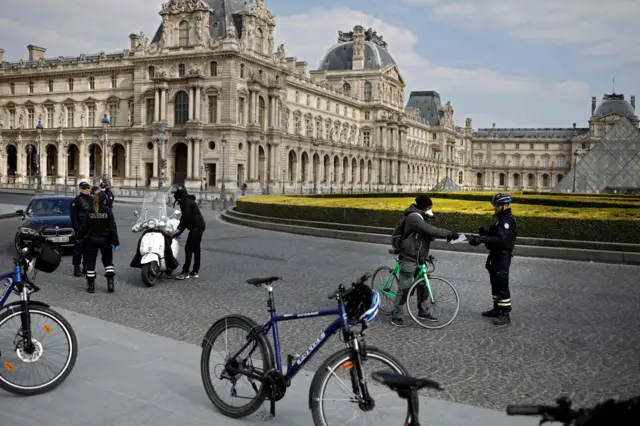 Image source, AFP
Image source, AFPPolice in Paris are tightening quarantine restrictions at the start of the Easter school holidays.
They will carry out extra checks at stations and airports, and on key roads, to try to prevent people leaving the capital for other parts of the country.
The Parisian police chief has warned that extra checks will begin at key points around the capital from Friday morning.
Anyone caught trying to leave for the Easter holidays will face a fine, and won't be allowed to board their train or flight.
French police have already carried out almost six million checks across the country in the past fortnight of confinement, and have issued 360,000 fines.
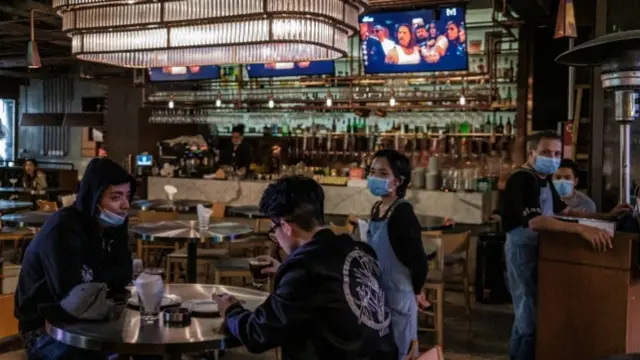 Image source, Getty Images
Image source, Getty ImagesIf you want a drink in a bar in Hong Kong, better head there now. Come 6pm, "any premises exclusively or mainly used for the sale or supply of intoxicating liquors must be closed" the government says.
The drastic move is the latest in a string of increasingly tough measures to enforce social distancing across the territory. It will be implemented for 14 days.
There is already a ban on public gatherings of more than four people and cinemas, nightclubs, karaoke lounges and mahjong parlours are already closed (mahjong is a tile-based game).
For now, restaurants can remain open - although there are strict rules to make sure guests don't sit too close to each other.
 BBC Breakfast
BBC Breakfast
England's Health Secretary, Matt Hancock, has described coronavirus as a "pretty unpleasant experience" after recovering from the illness.
He was unable to sleep for a couple of nights and it felt "like having glass in my throat", leaving him unable to eat or drink.
"It’s really worrying because we can all see just how serious this illness is," he said, adding that he had lost half a stone (3kg).
Google is to publicly track people's movements over the course of the coronavirus pandemic, so that the information can be used by public health officials and others to help manage the outbreak.
The tech firm will publish details of the different types of places people , externalare going to on a county-by-county basis in the UK, as well as similar data for 130 other countries.
The plan is to issue a daily update with the figures referring back to activity from two or three days prior.
The company has promised that individuals' privacy will be preserved.
The readings are based on location data gathered via the Google Maps app or one of the firm's other mobile services.
They will be broken down to reveal how busy some places have been, compared to a period earlier in the year before lockdowns were introduced.
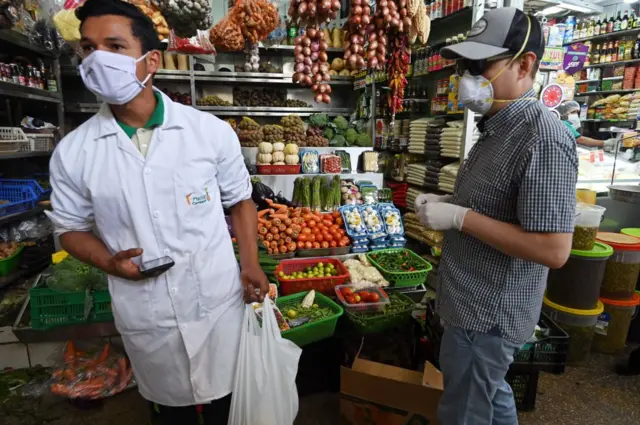 Image source, Getty Images
Image source, Getty ImagesPeru is to stop people from leaving their homes according to their gender, in a bid to slow the spread of the coronavirus.
Men will be allowed to go out on Mondays, Wednesdays and Fridays but only to buy essential items, President Martín Vizcarra announced in a national address.
Women will be free to leave their homes on the other days of the week, with the exception of Sundays, when no one will be allowed out.
The measures will be in place until at least 12 April. Panama announced similar gender-based restrictions last week.
Peru was one of the first countries in South America to introduce lockdown measures.
It has reported more than 1,400 cases of Covid-19 so far, according to figures compiled by Johns Hopkins University in the US.
Outrage over a Muslim congregation - called Tablighi Jamaat - that has sparked a new wave of Covid-19 cases in India has taken a communal turn.
Islamophobic hashtags have been trending since news first broke on Monday.
More more than 300 positive cases across India have been traced to the weeks-long event, which was held in the capital, Delhi, earlier this month.
Hundreds of people also stayed on at the event venue because of a 21-day lockdown.
Officials say they didn't follow social distancing, causing the virus to spread.
The fallout from the event - cases directly linked to it continue to rise - has exposed religious fault lines in a sharply polarised India.
Tweets and memes derogatory to Muslims, and even blaming the community, have been doing the rounds on social media.
"Instead of corona quarantine, we should have hate quarantine," historian Rana Safvi told the BBC.
India has reported 2,088 cases so far and 56 deaths - officials said there has been a clear spike as a result of the congregation in Delhi.
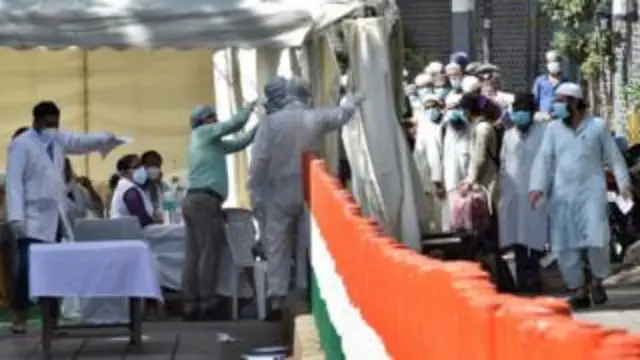 Image source, Getty Images
Image source, Getty ImagesOfficials spent days evacuating the centre where the event happened
Infections have been rising swiftly in Germany and now the Robert Koch public health institute says the death toll has reached 1,017, up 145 in the past 24 hours.
The confirmed number of cases is up 6,714 to 79,696, says the RKI. Meanwhile, Johns Hopkins University in the US says German infections are closer to 85,000, which would put Germany higher than the officially declared positive cases in China. Bavaria in the south has the highest number of cases, with 146.5 for every 100,000 residents, according to news agency DPA.
An empty race track, a swimming pool with not even a ripple and a hauntingly quiet gym devoid of athletes.
These pictures out of a sports centre in the New Zealand city of Auckland show the effect of the virus on everyday life.
The country is currently in a state of lockdown - mass gatherings have been banned and its borders closed to all foreigners.
There are currently 868 confirmed virus cases in New Zealand.
 Image source, Getty Images
Image source, Getty Images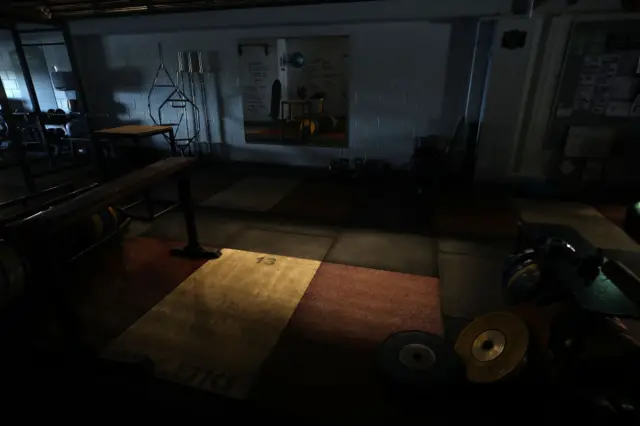 Image source, Getty Images
Image source, Getty Images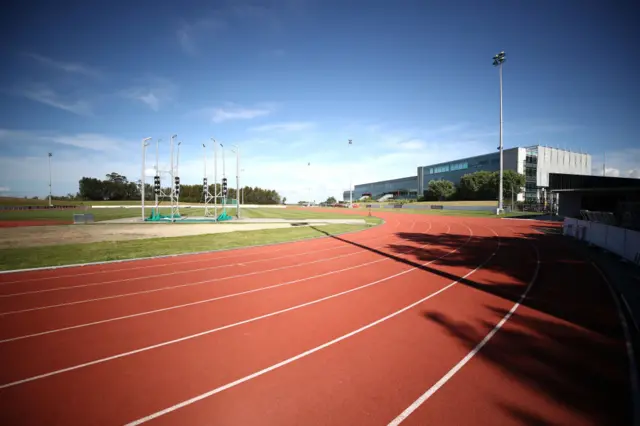 Image source, Getty Images
Image source, Getty Images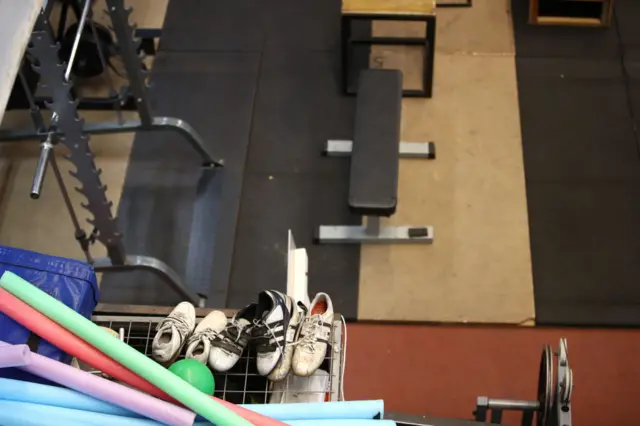 Image source, Getty Images
Image source, Getty Images Image source, Getty Images
Image source, Getty ImagesShah Rukh Khan to help various states to combat Covid-19
India's biggest Bollywood star, Shah Rukh Khan, has announced a series of measures to support efforts against Covid-19.
"Given the enormity of the task, my team and I discussed ways to contribute in our own modest way. We have come up with a series of initiatives, which we hope will make a small difference," he said in a statement on Twitter, external.
Khan will work with state governments in Maharashtra and West Bengal to help supply 50,000 items of PPE equipment for health workers.
He will also provide daily food requirements to more than 5,500 families in the city of Mumbai, where he lives, as well as set up a kitchen that will make 2,000 meals every day to serve homes and hospitals whose needs aren't being met.
The mega-star has appeared in more than 90 films and is considered one of India's most recognisable and popular celebrities.
 Roger Harrabin
Roger Harrabin
BBC environment analyst
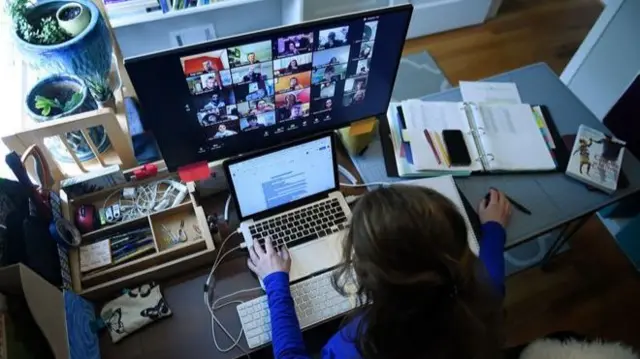 Image source, AFP
Image source, AFPIs the infrastructure we need for the future better motorways or broadband super-highways?
The coronavirus crisis will transform the way we live, work and travel, the president of the UK Automobile Association (AA) has said.
Edmund King has predicted a permanent reduction in travel because many people have learned to work from home.
The government currently plans to spend £100bn on the HS2 high-speed rail link and £27bn on roads to provide extra capacity but this will be challenged if travel reduces.
Mr King told BBC News: “Arguably in future we should invest more in broadband, because what this crisis has shown is the majority of companies can continue working from home. It can be more efficient and save money.”
Some say it’s too soon to predict a permanent increase in home working.
Others say road and rail spending should be frozen for a decade to review – and the cash diverted to insulating homes instead.
 Nick Triggle
Nick Triggle
Health Correspondent
On average, about 1,600 people a day die in the UK.
What is not known about the coronavirus deaths being reported is to what extent those deaths are on top of that figure - or a part of it.
Many of the victims are old and frail people with underlying health conditions who are therefore are at the highest risk of dying.
And experts predict there will be significant overlap between the coronavirus deaths and those who would normally be expected to die.
So what are death figures really telling us? And how bad is it going to get?
If you're just joining us in the UK, good morning and welcome. Here are the latest headlines:
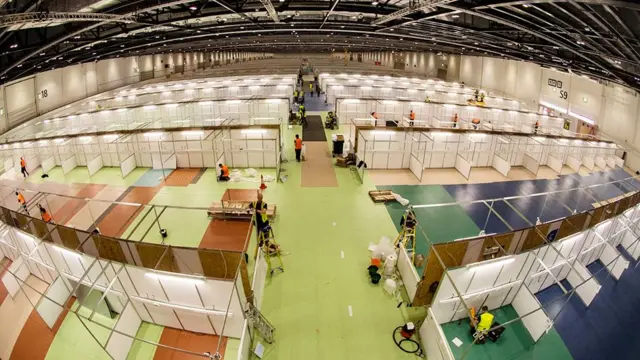 Image source, Getty Images
Image source, Getty ImagesThe new NHS Nightingale Hospital in London is set to open later today
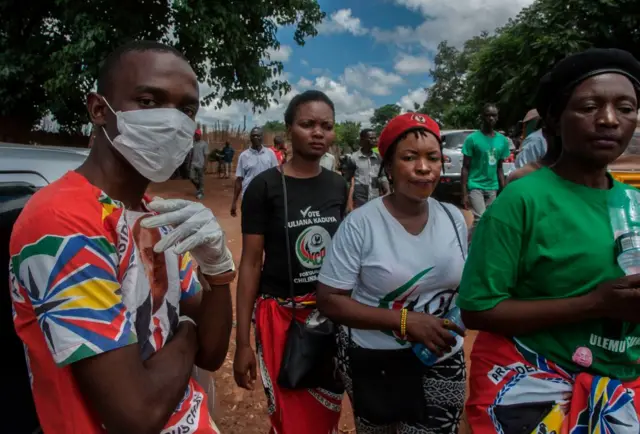 Image source, Getty Images
Image source, Getty ImagesThe cases were announced as the country prepares for a presidential election on 2 July
Malawi has reported its first three confirmed cases of coronavirus.
The southern African nation was among the few African countries yet to report cases. Others include Lesotho, Comoros, South Sudan and São Tomé and Príncipe.
The news means there are just 18 countries left without a confirmed case. Find out where they are here.
Resty Woro Yuniar
BBC News, Jakarta
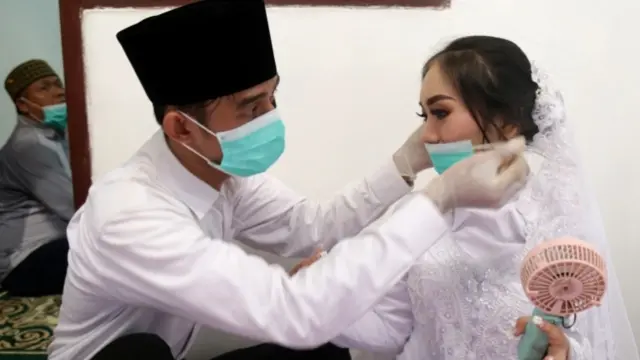 Image source, AFP
Image source, AFPPresident Joko Widodo has made a plea for Indonesians to cancel their annual mass exodus, typically occurring at the end of the Muslim fasting month, Ramadan (which this year ends 23 May).
He has also proposed to push back the national holiday, "to bring calm to the public".
Tens of millions of people in Indonesia, the world’s most populous Muslim-majority nation, each year flock to their hometown to celebrate Eid.
But this year the routine is deemed risky amid the coronavirus pandemic.
The government said it decided not to ban the mass exodus as it was unlikely that people would obey it.
They might be right. Despite declaring a public health emergency, urging public distancing and working from home, some roads in Jakarta are still very busy.
Not all people can afford to work from home, particularly informal workers who rely on daily income to live. The government is reluctant to implement a full lockdown, and people can still move in and out of the capital.
As of Thursday, Indonesia has 1,790 positive cases and 170 deaths, the highest death toll in Asia outside of China.
Coronavirus: Dressing up for bin night 'brings a smile' in Australia
Australians are having fun with fancy dress videos - bringing some relief to the stresses of lockdown.
Washing your hands is still one of the most effective ways to prevent yourself catching the virus. In case you need a refresher on how to do it right, here’s our 20-second explainer on the correct technique.
Coronavirus: How to wash your hands - in 20 seconds
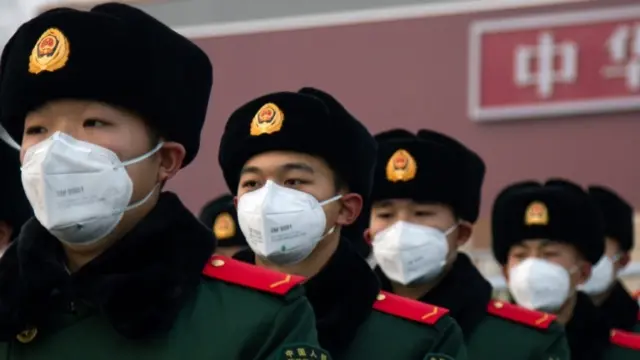 Image source, Getty Images
Image source, Getty ImagesChina will hold three minutes of silence across the country on Saturday to mourn the "martyrs" of the fight against the virus pandemic.
It's scheduled to happen at 10:00 local time (02:00 GMT) and the silence will be followed by air raid sirens and car horns "wailing in grief", state news agency Xinhua says.
The coronavirus emerged in China and numbers peaked in January and February, with the current total death toll above 3,300. Among the dead have been many health care workers and doctors.
In recent weeks, local transmission and new fatalities have been very low. Authorities say they are more worried about travellers importing the virus from abroad than local transmissions.